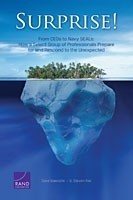| 来源类型 | Research Reports
|
| 规范类型 | 报告
|
| ISBN | 9780833081032
|
| 来源ID | RR-341-NRO
|
| Surprise! From CEOs to Navy SEALs: How a Select Group of Professionals Prepare for and Respond to the Unexpected |
| Dave Baiocchi; D. Steven Fox
|
| 发表日期 | 2013
|
| 出版年 | 2013
|
| 页码 | 106
|
| 语种 | 英语
|
| 结论 |
Certain Strategies Can Be Applied Universally- Experience is a key way to avoid surprises.
- Reducing the number of variables also reduces the complexity and size of the solution.
- A measured response preserves future options.
- Teamwork is essential, even for professions perceived as relying on individual actors.
Different Groups Prepare for and Respond to the Unexpected in Different Ways- Professionals in the most-contrived environments, such as athletic fields or theatrical stages, can plan reactions for nearly any possible contingency.
- Those in moderately chaotic environments like operating rooms rely partially on checklists and rules, but also employ some basic response frameworks.
- In highly chaotic environments, such as behind enemy lines, planning against specific surprise events is almost impossible. Instead, practitioners exercise a general-purpose framework.
Available Response Time Plays a Role- Tacticians, who must generally react within seconds or minutes, often must first overcome fear and anxiety. A typical protocol is to control panic, buy time, then revert to fundamentals learned in training.
- Strategists, who have days or weeks to react, generally face immediate feelings of anger and an impulse to overreact. A similar process for coping is employed: control emotions, take some initial enabling actions, quickly assemble key staffers, and disseminate a coherent longer-term response.
Surprises Generated by Humans Are Typically More Complex- When people are at the root of a surprise (as opposed to, say, the environment), the system becomes more complex and the potential outcomes become more unpredictable.
- The biggest surprises often come from third-party actors, not direct adversaries.
|
| 摘要 |
- Attract and retain the most experienced people.
- Strengthen communications and coordination between co-workers
- Develop mechanisms and tools to promote more-measured responses.
- Instill the workforce with the mindset that surprises can be both opportunities and learning experiences.
- Top-level strategists must have good communication with co-workers throughout the entire response effort.
- When appropriate, reach beyond one's immediate network and seek outside expertise.
- Keep an eye on third-party stakeholders.
- Assess the level of chaos in one's work environment, then develop strategies accordingly.
|
| 主题 | Business Process Improvement
; Corporate Governance
; Decisionmaking
; Occupations
; Special Operations Forces
|
| URL | https://www.rand.org/pubs/research_reports/RR341.html
|
| 来源智库 | RAND Corporation (United States)
|
| 资源类型 | 智库出版物
|
| 条目标识符 | http://119.78.100.153/handle/2XGU8XDN/107558
|
推荐引用方式
GB/T 7714 |
Dave Baiocchi,D. Steven Fox. Surprise! From CEOs to Navy SEALs: How a Select Group of Professionals Prepare for and Respond to the Unexpected. 2013.
|
|
文件名:
|
x1495294306640.jpg
|
|
格式:
|
JPEG
|

|
文件名:
|
RAND_RR341.pdf
|
|
格式:
|
Adobe PDF
|
除非特别说明,本系统中所有内容都受版权保护,并保留所有权利。